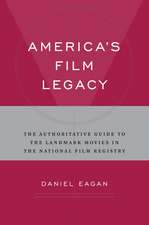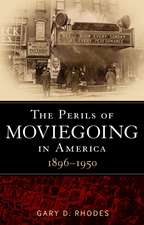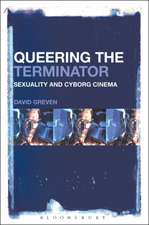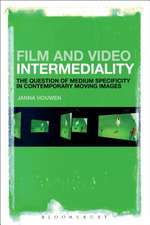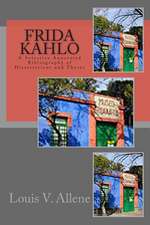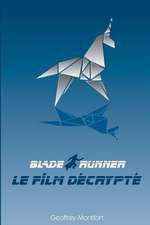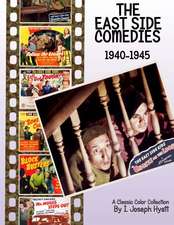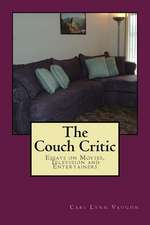Wim Wenders: Making Films that Matter
Editat de Olivier Delers, Martin Sulzer-Reichelen Limba Engleză Paperback – 28 iul 2021
| Toate formatele și edițiile | Preț | Express |
|---|---|---|
| Paperback (1) | 216.34 lei 6-8 săpt. | |
| Bloomsbury Publishing – 28 iul 2021 | 216.34 lei 6-8 săpt. | |
| Hardback (1) | 567.99 lei 6-8 săpt. | |
| Bloomsbury Publishing – 22 ian 2020 | 567.99 lei 6-8 săpt. |
Preț: 216.34 lei
Preț vechi: 274.20 lei
-21% Nou
Puncte Express: 325
Preț estimativ în valută:
41.40€ • 43.31$ • 34.39£
41.40€ • 43.31$ • 34.39£
Carte tipărită la comandă
Livrare economică 02-16 aprilie
Preluare comenzi: 021 569.72.76
Specificații
ISBN-13: 9781501384080
ISBN-10: 1501384082
Pagini: 208
Ilustrații: 36 bw illus
Dimensiuni: 152 x 229 x 15 mm
Greutate: 0.28 kg
Editura: Bloomsbury Publishing
Colecția Bloomsbury Academic
Locul publicării:New York, United States
ISBN-10: 1501384082
Pagini: 208
Ilustrații: 36 bw illus
Dimensiuni: 152 x 229 x 15 mm
Greutate: 0.28 kg
Editura: Bloomsbury Publishing
Colecția Bloomsbury Academic
Locul publicării:New York, United States
Caracteristici
The first book in 15 years to provide a critical review of the scholarship on Wenders
Notă biografică
Olivier Delers is Associate Professor of French and Chair of the Department of Languages, Literatures, and Cultures at the University of Richmond, USA. He is the author of The Other Rise of the Novel in Eighteenth-Century French Fiction (2015). Martin Sulzer-Reichel is Director of Arabic at the University of Richmond, USA. He is the author of A Change in Perception: The Arab Reception of Emperor Frederick II and Other Protagonists of the Crusades from the 13th Century Until Today (2015).
Cuprins
Introduction: New Perspectives on Wim Wenders as Filmmaker and Visual Artist (Olivier Delers and Martin Sulzer-Reichel, University of Richmond, USA) Watching the Road Trilogy in the Twenty-First Century1. Search for the Sublime: The Road Trilogy, or Wenders's Roam-man-ticism (Oliver Speck, Viginia Commonwealth University, USA)2. Writing in the Blood of the Past: Wrong Move and the Search for a Contemporary German Identity (Kristin Eichhorn,Universität Paderborn, Germany)3. The Window-View and the Romantic Vision of the World: Notes on a Visual Leitmotif in the Films of Wim Wenders (Philipp Scheid, Universität Bonn, Germany)Reimagining Cinema and Photography with Wenders4. As If It Were For The Last Time: Wim Wenders-Film and Photography (George Kouvaros, University of New South Wales, Australia)5. Wenders-Salgado: Space, Time and Transformation in Salt of the Earth (Darrell Varga, York University, Canada)6. Wim Wenders's Pina, a Cinematic Homage to Pina Bausch (Peter Beicken, University of Maryland, USA)Transnational Wenders7. Multitrack and Transcultural Narratives in Wim Wenders's Works (Simone Malaguti, Ludwig-Maximillians-Universität München, Germany)8. "I Can Imagine Anything": The European Project in Wim Wenders's Wings of Desire (Mine Eren, Randolph-Macon College, USA)9. Blandness and "Just Seeing" in the Films of Wim Wenders (William Baker, Ohio State University, USA)10. The Heart of Things: Wim Wenders and the Evocations of Peace (Mary Zournazi, University of New South Wales, Australia)AppendixBibliographyFilmographyAcknowledgmentsList of ContributorsIndex
Recenzii
This collection, which emanated from a 2017 conference on Wenders, goes a long way toward updating the director's reputation in light of his recent work and of new methodologies consequential to film studies . [Wim Wenders] does a solid job of showing that his later work has more than just curiosity value. Summing Up: Recommended. Upper-division undergraduates through faculty.
Wim Wenders: Making Films that Matter is an important and timely contribution to the scholarly literature on Wim Wenders and to film studies in general. Its collected essays constitute a long-overdue reassessment of Wenders as an important German auteur at a time in which Wenders's work has received little scholarly attention. The book's essays do invaluable work both by putting Wenders's films into the context of his work as a whole and by implicitly or explicitly addressing the politically motivated critiques that Wenders's films seem to offer only superficial engagement with their subjects. Taken together, the book's essays explicate the ways in which Wenders's filmic process and preoccupations with the technologies of seeing and their concomitant failings (the recuperative power of 'mere' sight, the interference of the camera/window/eye as medium that interposes between subject and object, and Wenders increasing concern with the ethics of his aesthetics as he works toward a collaborative 'language of peace') constitute at the same time the content of his work. This book is a long overdue reassessment of Wenders and his work.
Wim Wenders: Making Films that Matter is an important and timely contribution to the scholarly literature on Wim Wenders and to film studies in general. Its collected essays constitute a long-overdue reassessment of Wenders as an important German auteur at a time in which Wenders's work has received little scholarly attention. The book's essays do invaluable work both by putting Wenders's films into the context of his work as a whole and by implicitly or explicitly addressing the politically motivated critiques that Wenders's films seem to offer only superficial engagement with their subjects. Taken together, the book's essays explicate the ways in which Wenders's filmic process and preoccupations with the technologies of seeing and their concomitant failings (the recuperative power of 'mere' sight, the interference of the camera/window/eye as medium that interposes between subject and object, and Wenders increasing concern with the ethics of his aesthetics as he works toward a collaborative 'language of peace') constitute at the same time the content of his work. This book is a long overdue reassessment of Wenders and his work.

